The Muslims of the subcontinent have been in complete denial mode since 1857. Despite continuous deterioration in their socio-economic status, they are not mentally ready to accept that they have lost the race and are not ready to face the new world after the industrial and technological revolution. In 1947, a compromise was made to favour the Muslim majority provinces in the east and northwest part of the subcontinent at the cost of Muslims in other minority provinces. Additional space was provided to the areas of the northwestern parts of the subcontinent. Then, another compromise was made in 1971 when the Eastern wing decided to replace this particular brand of ideology with Bengali nationalism. Resultantly, the ‘brand’ of Muslim nationalism has presumably been limited to people of the northwestern part of the subcontinent.
‘Muslim nationalism,’ as envisaged by Sir Syed Ahmad Khan in the form of the Mohammadan Anglo Oriental College in Aligarh, was supposed to convert a feudal mindset heavily reliant on theological education into a society aware of the need for economic self-sufficiency and improvement of the knowledge and technological base.
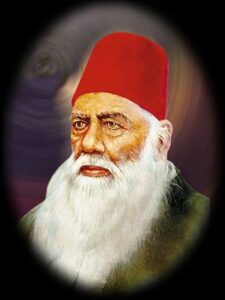
The decision made in 1947 to favour the northwestern parts of subcontinent that was supposed to be based on economic and technological sovereignty relied upon theology and illusions based on a wrong understanding of history. It was wrongly presumed that this economic and technological identity had to be transformed into an illusionary model related to some periods in history when Muslims were rulers in Baghdad and Cordoba. Even learned persons like Dr. Muhammad Iqbal, whilst praising the Muslim rule in Spain, ignored the fact that knowledge and technology is now possessed by Western societies with a Christian faith that overruled the Muslims in Spain. There is no point in lamenting some innovations made in the past by persons in the totalitarian rules in Baghdad and Cordoba. This disturbed and confused mindset has been diligently ingrained in the minds of people of the northwestern part of the subcontinent, politically known as Pakistan. They consider themselves custodians of the Muslim ‘Ummah,’ not realising that in knowledge and technology they are at least 300 years behind the rest of the world, and rank 164th in per capita income among 174 countries.
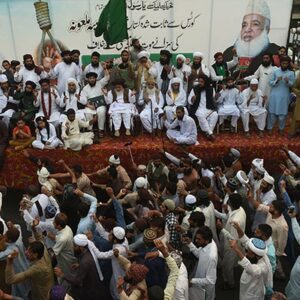
There is a constant and complete denial of two fundamental ground realities. Firstly, the fact that, at least after 1970, as a state we are constantly on a downward trend as far as the welfare of the common man and human development is concerned. This is reflected by constant current and fiscal account deficits that result in loans for current expenditure instead of the development side. Secondly, there is a denial that western societies have achieved good for the common man using the human intellect, instead of misinterpreted divine revelations. The second notion is followed by a perception that some rule-based model is available in the form of a society that flourished in Arabia around 1400 years ago.
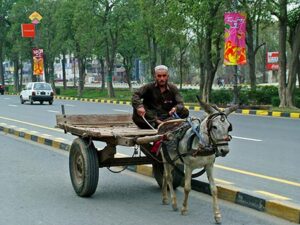
It is an undeniable fact that the best principles for relationship with other humans and the divine are laid down in the book revealed in Arabia around 1400 years ago. However, it is intentionally overlooked that these guidelines are universal principles not limited to a particular society. They allow complete freedom to human beings in applying human intellect in deciding the manner of living together in this world and do not prescribe rule based totalitarian dictates for society. As a result of these denials and contradictions, society in Pakistan is totally confused. Whenever there are discussions on any matter relating to economics or technology, even highly qualified people are not open to accepting the fact that whatever little success we have in the field of medicine, engineering, accounting, finance, banking and other such subjects is the product of borrowed systems developed in the West. These are the results of human endeavours, not divine revelations. The framework laid down by our religion relates to the bigger issue of universal goodwill and peace and is not supposed to lay down the rules, for example, for the manner of electing a mayor for the city. The latter job has been destined for human intellect, even if we adopt a divine framework. The principal issue is the misunderstanding of the conceptual balance between human intellect and divine revelations. If I do something good for others, the response now is not ‘thank you’ but ‘jazakallah.’ Even this is a misunderstanding of the divine revelation, as there is explicit direction to be thankful to the one who has done you a favour.
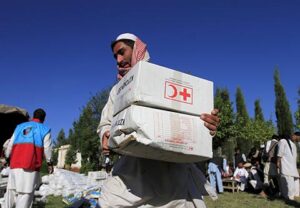
In the recent past we have seen the emergence of the Tehreek-e-Labbaik Pakistan (TLP) and the takeover by arms of Kabul by the Taliban. There are complete contradictions in these narratives. The Taliban, whose main slogan is reliance on ‘divine’ support for all worldly affairs are seeking help from the US and their allies for the economic catastrophe they are facing in Afghanistan. TLP leaders say that there is no need to repay Pakistan’s debt, as it is based on interest, which is not allowed in religion. The question is whether as a society we can live with these contradictions. On a lighter note, it will be good for Pakistan if it is not required to repay its debts. However, this foolishness does not prevail whilst sitting in the ‘Q’ Block in Islamabad, where you share the floor with the IMF office and the lady in charge of the IMF office, despite being a very junior person, is supposed to approve all our economic plans. There is nothing wrong in the saying ‘beggars can’t be choosers.’
The Pakistani establishment and politicians are facing misery when they face the real world. On the one hand, very rightly, they want to position the country as a modern, democratic, welfare state applying universal principles of human rights and rule of law and on the other, they are forced politically to take decisions that alienate them from the modern club of democratic welfare states with rule of law. These contradictions are destroying the very fabric of society.
A close analysis of the socio-economic factors reveals that the pseudo fundamentalists are an abject minority in the country. This reality has been demonstrated in every general election held in Pakistan since 1947. Except in KPK, which represents only 15 percent of Pakistan, such people have never been able to get more than 15 percent to a maximum of 20 percent of the vote. Their vote bank is constantly diluting. There is nothing wrong in having this percentage of fundamentalists, as long as they do not destroy the fabric of society. In Israel, the orthodox Jews are even more in number. The same is the case with ‘skinheads’ in the UK. Our problem is the undue importance given to these ignorable elements by the media. The problem lies with the so-called educated right wing people who have not been able to understand Mr. Muhammad Ali Jinnah. The political and economic independence of Muslim majority provinces, as laid down by Mr. Jinnah, has been completely destroyed by the abuse and misinterpretation of the Objectives Resolution of the Constitution. The Objectives Resolution, like all other frameworks, is not a rules-based framework. The universal principles of human rights and rule of law as enunciated in any books and also by our book, would remain the primary framework for law makers. However, it does not in any manner mean that rules-based regulations depending upon the interpretation of a particular theocratic mindset are to be adopted. There has to be an interpretation to be made with the mindset of Mr. Jinnah, not Mr. Zia-ul-Haq.
The confusion about the objectives of the state has prevailed upon economic decision-making. Nevertheless, in the recent past, there is in some academic quarters a rightful debate concerning a reality check about the economic degradation we have suffered in the past fifty years (1970-2020). After an initial reaction from the denial mentality, there is by and large a realisation that as a state our finances are not in good order. They cannot be corrected in the short term.
When we start the New Year 2022, we should abstain from the notion that there will be major positive change in the economic situation of the country during the year. The minor correction that will arise due to good actions by the government will be swallowed up by the heavy burden of errors made in the past. The three big burdens which have completely been ignored are (i) local and foreign debt, (ii) energy cost (in India the cost is Rs. 6.09 per kilowatt hour (kwh) and in Pakistan the cost is Rs 25.60 per kwh) and (iii) losses due to state owned enterprises. What I expect in 2022 is further reality checks on the economic situation of the country. The first meeting of the National Security Council with a declaration that economic insecurity may cause national security issues for the country is the first step out of the denial mentality. On the social front, there is a dire need to develop the correct narrative about the objectives of the state and dispel the impression that the model of a rules-based state will emerge from some divine revelation. The Divine has ordained this job to be done through human intellect.
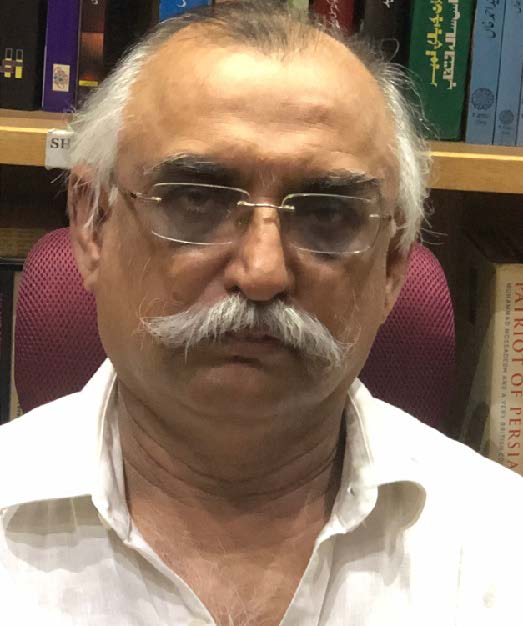
The writer is one of Pakistan’s best-known chartered accountants and a senior partner in A.F. Ferguson. He served as the 26th chairman of the Federal Board of Revenue.



